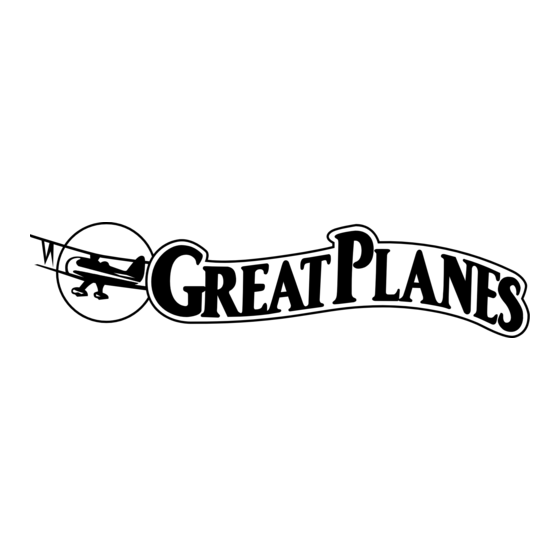GREAT PLANES Dazzler ARF Manuel d'instruction - Page 18
Parcourez en ligne ou téléchargez le pdf Manuel d'instruction pour {nom_de_la_catégorie} GREAT PLANES Dazzler ARF. GREAT PLANES Dazzler ARF 20 pages.

AMA SAFETY CODE (excerpt)
Read and abide by the following Academy of Model
Aeronautics Official Safety Code:
General
1. I will not fly my model aircraft in sanctioned events, air shows,
or model flying demonstrations until it has been proven to be
airworthy by having been previously successfully flight tested.
2. I will not fly my model aircraft higher than approximately
400 feet within 3 miles of an airport without notifying the
airport operator. I will give right of way to and avoid flying in
the proximity of full-scale aircraft. Where necessary an
observer shall be used to supervise flying to avoid having
models fly in the proximity of full-scale aircraft.
3. Where established, I will abide by the safely rules for the
flying site I use and I will not willfully and deliberately fly my
models in a careless, reckless and/or dangerous manner.
4. I will not fly my model unless it is identified with my name
and address or AMA number, on or in the model.
5. I will not operate models with pyrotechnics (any device
that explodes, burns, or propels a projectile or any kind).
Radio Control
1. I will have completed a successful radio equipment
ground check before the first flight of a new or repaired
model airplane.
2. I will not fly my model aircraft in the presence of
spectators until I become a qualified flier, unless assisted by
an experienced helper.
3. I will perform my initial turn after takeoff away from the pit
or spectator areas and I will not thereafter fly over pit or
spectator areas, unless beyond my control.
4. I will operate my model using only radio control frequencies
currently allowed by the Federal Communications Commission.
The Dazzler is a very fun and enjoyable plane to fly. It is very
predictable when balanced at the recommended C.G. and
the control throws are set at the low rate recommendation.
Set up this way you will find that it performs most aerobatic
maneuvers with ease. Move the C.G. back and step up to
the high rate control throws and you will have a very
responsive, fun fly type of plane!
FLYING
The Dazzler has no bad ground handling characteristics.
Simply line up on the runway, advance the throttle slowly,
make steering corrections as needed with the rudder and
you will be airborne in about 50 feet.
Once airborne you will find that the Dazzler performs slow
flight maneuvers as easily as it performs at faster speeds.
Tight loops, large loops, slow rolls, fast rolls, inverted flight
are all easily done with the Dazzler. Do you like to participate
in fun fly competitions? Try the limbo! You will be surprised
how low and slow you can fly!
CAUTION (THIS APPLIES TO ALL R/C AIRPLANES):
If, while flying, you notice any unusual sounds, such as a
low-pitched "buzz," this may be an indication of control
surface "flutter." Because flutter can quickly destroy
components of your airplane, any time you detect flutter you
must immediately cut the throttle and land the airplane!
Check all servo grommets for deterioration (this will indicate
which surface fluttered) and make sure all pushrod linkages
are slop-free. If it fluttered once, it will probably flutter again
under similar circumstances unless you can eliminate the
slop or flexing in the linkages. Here are some things which
can result in flutter: Excessive hinge gap; Not mounting
control horns solidly; Sloppy fit of clevis pin in horn; Elasticity
present in flexible plastic pushrods; Side-play of pushrod in
guide tube caused by tight bends; Sloppy fit of Z-bend in
servo arm; Insufficient glue used when gluing in the elevator
joiner wire or aileron torque rod; Excessive flexing of aileron,
caused by using too soft balsa aileron; Excessive "play" or
"backlash" in servo gears; and Insecure servo mounting.
When it comes time to land the Dazzler, you will find it is as
predictable to land as it was to fly. Simply line it up on the
runway and slowly decrease the speed. When you are over
the runway, drop the throttle and flare to a three point landing!
Have a ball! But always stay in control and fly in a safe manner.
18
Takeoff
Flying
